This issue is in your inbox thanks to an email I received in response to yesterday’s “Couchfish turns two.” The reader wrote of their intrigue around making Travelfish more responsible. “How do you make a travel guide responsible?” they asked, “it isn’t like you’re cutting down trees to print guides.” As this is something that has been on my mind for much of the last two years, I thought I’d lay out a short version of my thinking. Feedback and suggestions, as always, are more than welcome and appreciated. Back to our regular schedule tomorrow!
In Travelfish’s case, responsibilities flow in two ways: to the reader and the destination. An approach may benefit a reader, but damage a destination or vice-versa. Then there’s our bottom line—we do need to make money, so that comes into the mix as well. There is no shortage of balancing required.
Couchfish is two years old!
Wednesday was the two–year anniversary of Couchfish. To celebrate, I’m offering a 50% off deal until April 14 on annual subscriptions. So this means it costs US$35 instead of $70—for the year. Already a subscriber? First, thank you, second, feel free to send the link to your friends—all are welcome!
When it comes to responsibility, I see five bases. Planet, places, people, profit and publishing. Below I touch on each of these briefly—this is not an exhaustive look at my thoughts on this matter!
Planet
Let’s start with the easy one. Flying. The evidence is clear, flying is the single best way for you to up your contribution to cooking the planet. Yet, people are flying more than ever. In 2019, air travel made up 59% of holidaymakers’ transport-related emissions (UNWTO). That’s up from 46% in 2000. The long haul flight may be unavoidable, but what’s the best way to encourage people not to use a domestic flight? That is, aside from saying “don’t do flying.” Remove the flight section? That seems a bit overbearing. I’m still at a loss here.
Four hours to go. Photo: Stuart McDonald.
Before Covid-19 we had writers in many of the countries we cover, so for them, there was little flying. For me though, in 2019 I was outside of Indonesia for about two weeks every month, all short trips, with a lot of flying. No going back to that.
Places
Then there are the destinations themselves. When is it ok to write about somewhere? Here the responsibility pulls in two directions. Is it to the reader who wants to know about places that are rarely written about or visited? Or to a destination, where residents may not want or be able to absorb, foreign visitors at all?
Boiled down, this revolves around the “right to travel” mindset—a concept I don’t agree with. Travel is a privilege—not a right. As travellers, we’re privileged to have a foreign country allow us to visit. And yet, who, travelling in Laos in the 1990s didn’t cringe at the “No tourists please” signs around Muang Sing? How do we avoid that rinse and repeat cycle?
Three hours to go. Photo: Stuart McDonald.
Small islands and remote areas are particularly challenging to get right. They’re often ill-equipped to accommodate vast visitor growth over a short period of time. Small island economies like Ko Tao often develop an over-reliance on tourism. This in turn leaves them susceptible to changes in demand outside their control. On Ko Lipe, tourism exacerbated issues around water, food and infrastructure. In Senaru on Lombok, outside entrepreneurs cornered the tourism market. The list goes on.
Here, much responsibility falls upon travel guides and writers to do a better job. To consider the ramifications of crowing about a “new unspoilt island”. Yes, it is true, Travelfish raving about some “new remote area” may not result in Rick Steves driving a bus there. Yet, every word written is one of the thousand knives. After all someone, years ago, first told travellers to go cycle to the villages around Muang Sing.
People
Then there’s people and their places where, if it was up to them, they’d be nobody visiting. These need better consideration and consultation. It should be their decision. Ok, so as a writer, who do we ask? Who makes that decision? What happens when some people want tourists and others don’t? I’ve encountered this sort of challenge myself, and it is one I’m still trying to figure out how best to navigate.
Two hours to go. Photo: Stuart McDonald
A good travel guide can play a crucial role in mediating the relationship between travellers and local people. A guidebook can be invaluable as a cultural cookbook, explaining at a novice level, why things are as they are. Yet, outside of the “front or back of the book” local people often end up on the cutting room floor.
How often have you read that you can “have a destination all to yourself”? What does that mean? Are there no local people there? Do they not matter? Write about destinations in this way, as I have many times, and you risk influencing how readers view and interact with residents. They might start viewing them as nothing more than a postcard background. Need it to be said, this is problematic. I have so much of my own writing to rewrite in this regard.
Profit
What about hotels? Did you know that the largest single expense of a typical medium-sized hotel is electricity? Is that energy coming from a renewable source? In most cases in Southeast Asia, no. It’s easy to say, don’t use the air-con, but a typical modern hotel room assumes you will. More often than not, a room is uninhabitable without it. So what to do?
One hour to go. Photo: Stuart McDonald.
Small things help. Don’t leave the spare room key in a slot to keep the air-con pumping. Change the temperature from sub-Arctic to the low twenties—Centigrade! If your room has windows, forgo air-con and open them. Unplug the TV, DVD player and minibar. Skip the room with a private pool.
On the topic of water, what about it? The average guest at a small hotel uses over eighty litres per day. Stay at a golf course resort and that figure can increase a bit. How much? How do 2,425 litres a day sound? If you’re thinking there’s no way you use 85 litres a day showering, you’d be right. There is though a swimming pool, and gardens and grounds that need watering. What about the decorative water feature in the lobby. They all count. Doubly so for properties in a location already dealing with water accessibility issues.
Here plenty of responsibility falls into the hotels’ lap. They can run their electrical devices in a sane manner. They can install water-saving tap fittings and repair leaking loos. They can only supply a bar fridge if a guest requests it. And you know what? These steps will all save the property money in the longer term. Saving the planet and making money—why do so many hotels need convincing on this?
I’m not suggesting travel guides get in on the environmental audit business as that’s already well catered to by grifters. A good start though would be to outline all the above steps—and more. Yet, on Travelfish, I’ve written nothing on this. Onto the list, it goes.
Publication
Sticking with hotels for a moment. One of Travelfish’s main revenue sources was hotel booking commissions. A classic responsibility trade-off area.
Almost there. Photo: Stuart McDonald.
Online Travel Agents (OTAs) like Agoda, Booking, Expedia etcetera can take a hefty commission. That commission then gets off-shored, meaning it doesn’t stay in-country. Booking for example has headquarters in Holland. So when you pay $100 for a room, a chunk of that may go to Holland—and some to Travelfish if you clicked through from us. Thank you!
So, to keep money in-country, the responsible thing is to recommend readers book with the hotel direct. Hotels complicate this though as they often charge more than the OTA. So doing this will cost you money. Also, as the hotel doesn’t pay Travelfish anything, it costs us money too.
Subscribe to Talking Travel Writing
This post is all a bit travel writing inside baseball, but if that’s your kind of medicine, you should definetely consider signing up for Talking Travel Writing. Written by travel writers Lottie Gross and Steph Dyson (among other guests) it comes in free and paid flavours and, well, if you’ve an interest in travel writing, it belongs in your colection of newsletters.
Putting the reader first, you could list the OTA and the official website (this is what we do on Travelfish). In this way, we push the decision to the reader, yet, many have no clue how the OTA sausage factory works. We need to better inform our readers.
With the writing process, for the most part, I’m comfortable. I get the math and understand why it happens, but the whole complimentary stay/media rate thing is unethical in my opinion, so we don’t do it. We’ve always had a strict “no freebies/media rates” approach. So in this regard, we operate in a responsible fashion.
There are two other copy areas though, where I’m far less comfortable. In the language we use around local people (see above), and, colonial aspects of our coverage. In these areas, we can do far better—and will, eventually. It is already on my list. See here for a good primer on decolonising how you travel.
The other area in the writing process is the writers themselves. While, over the years, we’ve had three Singaporean writers, we’ve never had a writer from anywhere else in the region. Another area where we must improve.
Making a good trip better, for everyone
For most service travel writing (guidebooks, Travelfish etc), the historic primary duty is clear. To the reader. Tell them how to get there, where to stay, what to eat and see. To a point, there is nothing wrong with this. Yet, travel writing needs to do a better job of informing readers of the true calculus of their travels. Yes, the financial costs of their journey, but also the social and environmental ones. Travel writing also needs to do a far better job taking on the needs and concerns of people living in the destination.
Bingo. Photo: Stuart McDonald.
It need not be an exercise in making people feel shit about their holiday. Rather, showing them an improved way to travel. One that better benefits local communities, the destination’s wallet and the planet’s health. That has to be a good thing.
I hope so because this is where I’m heading.
As I wrote up top, feedback and suggestions, as always, are more than welcome and appreciated. Please let me know what is important to you when you think about travelling responsibly. What could we do better?
Couchfish is 100 per cent independent and reader-supported. If you’re not already a subscriber, and you’d like to show your support, become a paying subscriber today for just US$7 per month—you can find out more about Couchfish here—or simply share this story with a friend. Better still get 50% off all plans (until April 14) here.
Don’t forget, you can find the free podcasts on Apple, Pocket Casts and Spotify as well as right here on Couchfish.

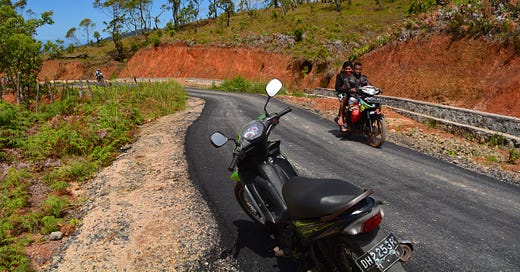


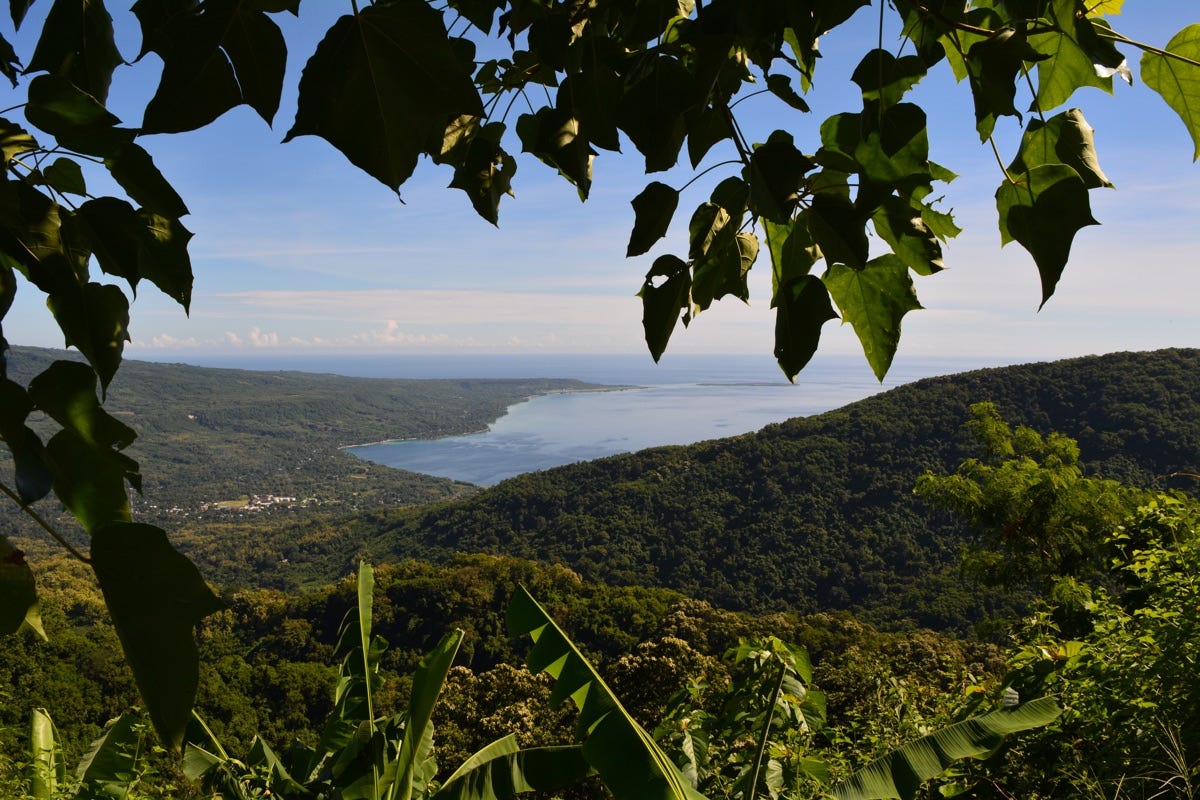









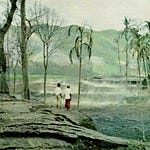

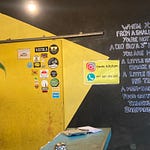
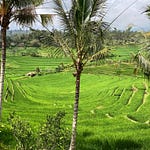

Share this post